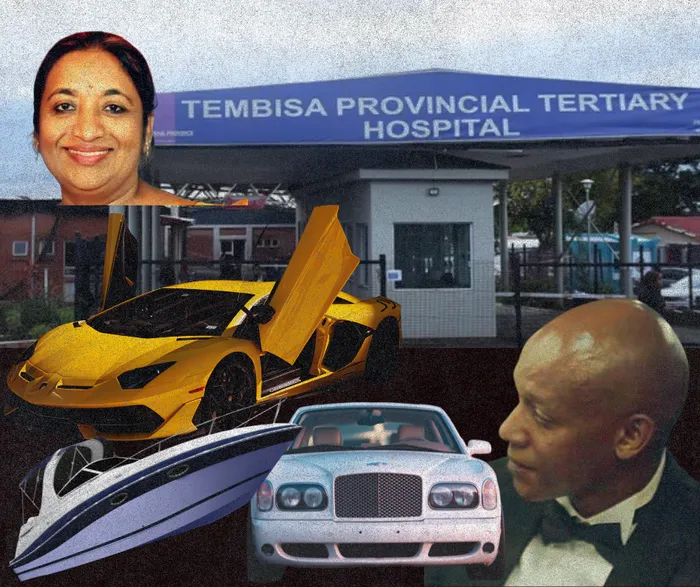
The Special Investigating Unit (SIU) report has exposed how the syndicates bypassed tender processes to loot Tembisa Hospital of more than R2 billion.
Image: IOL Graphics
ONE of the main syndicates linked to the looting of more than R2 billion from Tembisa Hospital has properties in the Western Cape, according to the Special Investigating Unit (SIU) interim report.
The three main syndicates are the Maumela syndicate, Mazibuko syndicate and syndicate X. The Maumela syndicate is linked to Hangwani Maumela (the nephew of President Cyril Ramaphosa through a previous marriage) and the Mazibuko syndicate is linked to Rudolph Mazibuko, while investigations are continuing into X syndicate.
The Maumela syndicate is associated with R816m in fraudulent contracts at the hospital. The SIU has identified and preserved significant assets, including luxury vehicles and properties, related to this syndicate.
Three of the companies awarded contracts under the Maumela Syndicate are linked to Vusimuzi ‘Cat’ Matlala, who was arrested in May and charged with the attempted murder of his former partner, actress Tebogo Thobejane.
The Mazibuko syndicate is connected to fraudulent transactions worth R283m. The investigation has identified properties in Gauteng and the Western Cape linked to this syndicate.
The X syndicate is linked with procurement bundles valued at R596m, with assets worth about R150m identified.
The SIU also found a number of smaller, interconnected syndicates that collectively looted millions through a network of corrupt officials and service providers.
Its investigation, prompted by the murder of whistleblower, Babita Deokaran, found that corrupt officials colluded with the service providers to exploit weaknesses in the procurement system.
Deokaran, who was an official at the Gauteng Department of Health had uncovered massive malfeasance related to fraud, corruption and maladministration at the hospital and the syndicates had devised devious means to avoid regulatory triggers. She was killed in August 2021, after exposing large-scale corruption and fraud.
Deokaran was the first to flag suspicious payments to over 200 companies, totalling around R850 million at Tembisa Hospital.
However, the amounts identified by the SIU investigation now exceed R2bn.
At least 15 current and former employees have been implicated in the scandal.
The SIU also identified that the syndicates kept the value of purchase orders below R500,000, which is the threshold for formal tenders. This enabled them to use a less-stringent three-quote system for procurement, which was easier to manipulate.
The investigation found that this was intentionally abused to circumvent the tender process and to keep the authorisation level as low as possible.
“In addition to the service providers raking in millions, it is the officials on the ground, at the grassroots level, who benefited most financially from the unscrupulous looting at Tembisa Hospital. These officials controlled the supply chain management (SCM) processes, they created a fictitious need, went through a bogus procurement process and fraudulently signed for goods which were, most likely, never delivered,” stated the report.
Officials intentionally split the requests for quotations (RFQs) for similar goods and services into smaller contracts to ensure they remained below the R500,000 threshold.
The SIU also found that suppliers frequently provided separate invoices for different items, all issued on the same day for the same amounts linked separate purchased orders.
“By circumventing the tender procurement process, the risk of potentially revealing the true identity of the beneficial owner(s) of the supplier(s) is minimised, as it allows for the containment of irregular procurement processes within the Tembisa Hospital."
The SIU confirmed exactly this, that major syndicates were at work at Tembisa Hospital.
"Various service providers formed groups, i.e. syndicates, they colluded with one another, committed acts of fraud and corruption, all to hide the true identities of those who finally benefited from the Tembisa Hospital cash cow, the ultimate Kingpins, private individuals living the high life, spending millions on lavish lifestyles,” read the report.
Suppliers were not sourced from the central supplier database (CSD) nor were they on the required commodity list. There was no rotation of service providers to keep it fair and equitable. Instead, most service providers could be traced back to a small coterie of beneficial owners.
“The RFQs were sent to predetermined bidders waiting in the wings, bidders linked to the various syndicates that operated at Tembisa Hospital. The whole looting scam would not have succeeded if potential service providers were randomly sourced from CSD.
“For the exploitation of Tembisa Hospital to succeed, the selection of service providers could not be random; it had to be controlled to ensure that preselected bidders were appointed, which would ultimately benefit the kingpins.”
The syndicates awarded contracts to front companies that did not legitimately qualify. Investigations showed extensive fraud, including fabricated company documents, tax clearance certificates, and Black Economic Empowerment affidavits.
Many of the goods procured by the hospital qualified as “medical devices” under the Medicines Act, which requires a registration and licensing from the South African Health Products Regulatory Authority (SAHPRA). However, none of the service providers were issued with the relevant SAHPRA licences to supply the purported medical devices.
Governance expert Professor Zwelinzima Ndevu from the University of Stellenbosch, said the SIU investigation paints a picture of a public service that is rotten, adding that corruption has become a norm in the departments.
“What we see in the reports on Tembisa is a tip of the scale on corruption happening in the country, I think there is more to come,” he said.
Cape Times